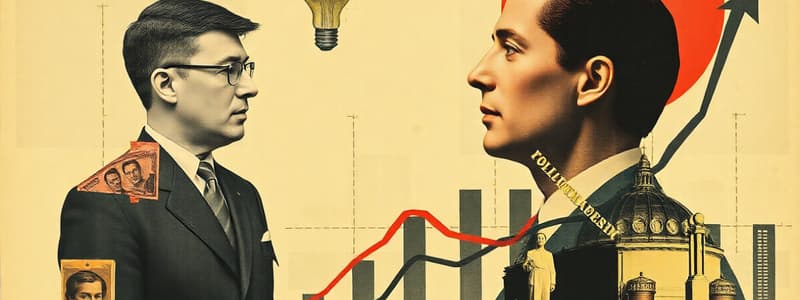Podcast
Questions and Answers
What was a primary concern for Federal Reserve Chairman Paul Volcker according to the news story from early 1986?
What was a primary concern for Federal Reserve Chairman Paul Volcker according to the news story from early 1986?
- To keep monetary policies independent of political influence
- To increase inflation regardless of political pressure
- To disregard the economic condition of the country
- To align his policies with the interests of the White House (correct)
According to Robert Strauss, what will influence Volcker's decision-making in 1986?
According to Robert Strauss, what will influence Volcker's decision-making in 1986?
- Global economic trends
- The desire for inflation in certain regions (correct)
- Congressional budget proposals
- Economic data from the Federal Reserve
What did top White House aides communicate to Volcker before the discount rate was reduced in 1982?
What did top White House aides communicate to Volcker before the discount rate was reduced in 1982?
- The President wanted a permanent increase in interest rates
- Voting patterns would correlate with interest rate changes
- Expansion of the money supply was not a priority
- A faster expansion of the money supply was desired (correct)
What prediction did suspicious Democrats in Congress make regarding interest rates after the 1982 elections?
What prediction did suspicious Democrats in Congress make regarding interest rates after the 1982 elections?
What was the trend in interest rates immediately after the 1982 elections?
What was the trend in interest rates immediately after the 1982 elections?
What metaphor is used to describe the Federal Reserve's approach since its creation in 1913?
What metaphor is used to describe the Federal Reserve's approach since its creation in 1913?
What did officials think would be the outcome of their approach to fine-tuning business conditions?
What did officials think would be the outcome of their approach to fine-tuning business conditions?
What does the term 'metal fatigue' refer to in the context of the content?
What does the term 'metal fatigue' refer to in the context of the content?
What was the Federal Reserve's action regarding the discount rate in 1982 aimed at?
What was the Federal Reserve's action regarding the discount rate in 1982 aimed at?
In what way did political power relate to economic decisions according to the content?
In what way did political power relate to economic decisions according to the content?
Flashcards are hidden until you start studying
Study Notes
Political Influence on Monetary Policy
- In 1986, the White House pressured the Federal Reserve Chairman Paul Volcker to loosen monetary policy to boost economic growth before the congressional elections.
- The demand for "easy money" came especially from areas of the country where inflation was desired.
- In 1982, White House aides urged Volcker to expand the money supply to lower interest rates and stimulate the economy before the election.
- Democratic members of Congress predicted that interest rates would rise after the election, which ultimately proved correct.
- The suspicious Democrats were right, and interest rates rose immediately after the 1982 elections.
- The rise in interest rates ended just before the 1984 elections, suggesting a pattern of political influence.
- The news blurbs from 1982 and 1986 showcase an example of monetary policy being used to "fine tune" the business cycle and potentially influence elections.
The Metal Fatigue of Monetary Policy
- The author argues that monetary policy hasn’t worked as intended since the creation of the Federal Reserve System in 1913.
- He describes the system as having "metal fatigue" and being in danger of breaking.
- The panic of 1980 is cited as a warning sign of the system's fragility.
- The author argues that the government’s manipulation of the economy through monetary policy has had detrimental consequences for the population.
Studying That Suits You
Use AI to generate personalized quizzes and flashcards to suit your learning preferences.



